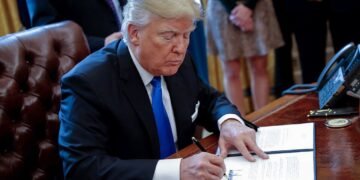By Charles Igwe
U.S. President Donald Trump has signed a new executive order barring entry into the United States from 12 countries, expanding on his history of restrictive immigration policies. The order, signed on Wednesday, June 4, places full travel bans on citizens of Afghanistan, Chad, the Democratic Republic of the Congo, Equatorial Guinea, Eritrea, Haiti, Iran, Libya, Myanmar, Somalia, Sudan, and Yemen.
In addition, seven other nations—Burundi, Cuba, Laos, Sierra Leone, Togo, Turkmenistan, and Venezuela—face partial restrictions under the same proclamation.
The White House announced the decision via official social media channels, stating that the move is part of broader national security efforts aimed at preventing the entry of individuals from countries “where we cannot safely and reliably vet and screen.”
“We cannot have open migration from any country where we cannot safely and reliably vet and screen,” Trump said in a video statement. “That is why today I am signing a new executive order placing travel restrictions on countries including Yemen, Somalia, Haiti, Libya, and numerous others.”
The proclamation allows for future revisions, with Trump stating that countries could be removed from the list if they make “material improvements” in vetting standards and cooperation with U.S. security requirements. Conversely, more countries could be added “if threats emerge around the world.”
The White House cited concerns about “dangerous foreign actors” as the main reason for the expanded travel ban. Trump referenced a recent attack during a pro-Israel rally in Colorado, where 12 people were injured, to bolster his case for tighter immigration controls. However, the suspect in that incident is reportedly from Egypt—a country not included on the ban list.
This latest move echoes Trump’s 2017 travel ban early in his first term, which targeted several Muslim-majority nations and faced widespread criticism, legal challenges, and protests.
Critics argue the new order may face similar scrutiny, given its sweeping nature and the inclusion of several countries with no direct link to recent acts of violence in the U.S. Nonetheless, Trump and his supporters maintain that the restrictions are essential to national security and a necessary step to ensure the safety of American citizens.















































